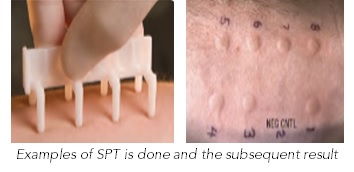What is Allergic Rhinitis?
Allergic Rhinitis (AR) is an inflammatory condition of the nose as a result of the body's allergic response to specific allergens. When the body comes into contact with allergens, antibodies are produced, resulting in the release of histamine.
Symptoms of allergy commonly include itchy nose, sneezing, stuffy nose and runny nose.

Why Do I Have Allergic Rhinitis?
While the real causes are not fully understood, AR can be attributed to several factors:
AR is partly inherited – you are more likely to have it if you have a family history of AR
Our immune system's interaction with the environment – Symptoms may disappear completely for a period due to a change in environment (e.g. moving to another country). However, AR may slowly develop again over time.
Patients who are more prone to allergies are at higher risk of developing other conditions, such as asthma and atopic dermatitis (i.e. eczema). This is most commonly seen in children during their developmental years.
Causes of Allergic Rhinitis
Common allergens that we breathe in are:

*Majority of AR patients in Singapore are allergic to HDM
How is Allergic Rhinitis Diagnosed?
A Skin Prick Test (SPT) is usually done to test for allergy. A standardised allergen is introduced into the epidermis (top layer of the skin) using a plastic lancet. This may cause mild discomfort but is tolerated well by most patients.
After 15 to 20 minutes, the test area is assessed for a development of an allergic response, such as swelling, redness and itching – much like the reaction to a mosquito bite.

How is Allergic Rhinitis Treated?
Allergen Avoidance
Allergen avoidance is always a key priority.
For example, if you are allergic to house dust mites, it is important to change your bedding regularly, and remove carpets and soft toys. Realistically, it is almost impossible to totally remove all allergens from the environment. Thus allergen avoidance alone is not enough to control allergic rhinitis.
Medications
Depending on your symptoms, your surgeon will prescribe you different medications.
- For intermittent and mild symptoms, non-drowsy anti-histamine would be prescribed to block allergic symptoms.
- For persistent, moderate to severe symptoms, an intranasal steroid spray is usually prescribed for long term control.
Often, many people have concerns about the side effects of steroids. However, modern intranasal steroids have been designed to only target the nose with minimal absorption to the rest of the body. Some intranasal steroids may even be used in children as young as two years old.
Surgery
When medications are insufficient to improve symptoms, surgery could be another option. For these people, surgical reduction of the inferior turbinate can be performed (Refer to “Inferior Turbinate Reduction Surgery” pamphlet).
Immunotherapy
While medications for AR are effective in controlling symptoms, they do not necessarily treat the underlying cause.
Immunotherapy offers the closest we can get to a cure.
What is Immunotherapy?
- Involves long term exposure to very small quantities of allergen so as to desensitise the immune system and eventually, prevent the symptoms from reoccurring
- A course typically lasts between three to five years
- E.g. Sublingual immunotherapy (SLIT)
Benefits of Immunotherapy
- Be symptom-free for at least 7 years
- Reduction in the rate of developing new allergies
- Improved quality of life
- Painless, effective and safe treatment with a chance of a permanent solution
